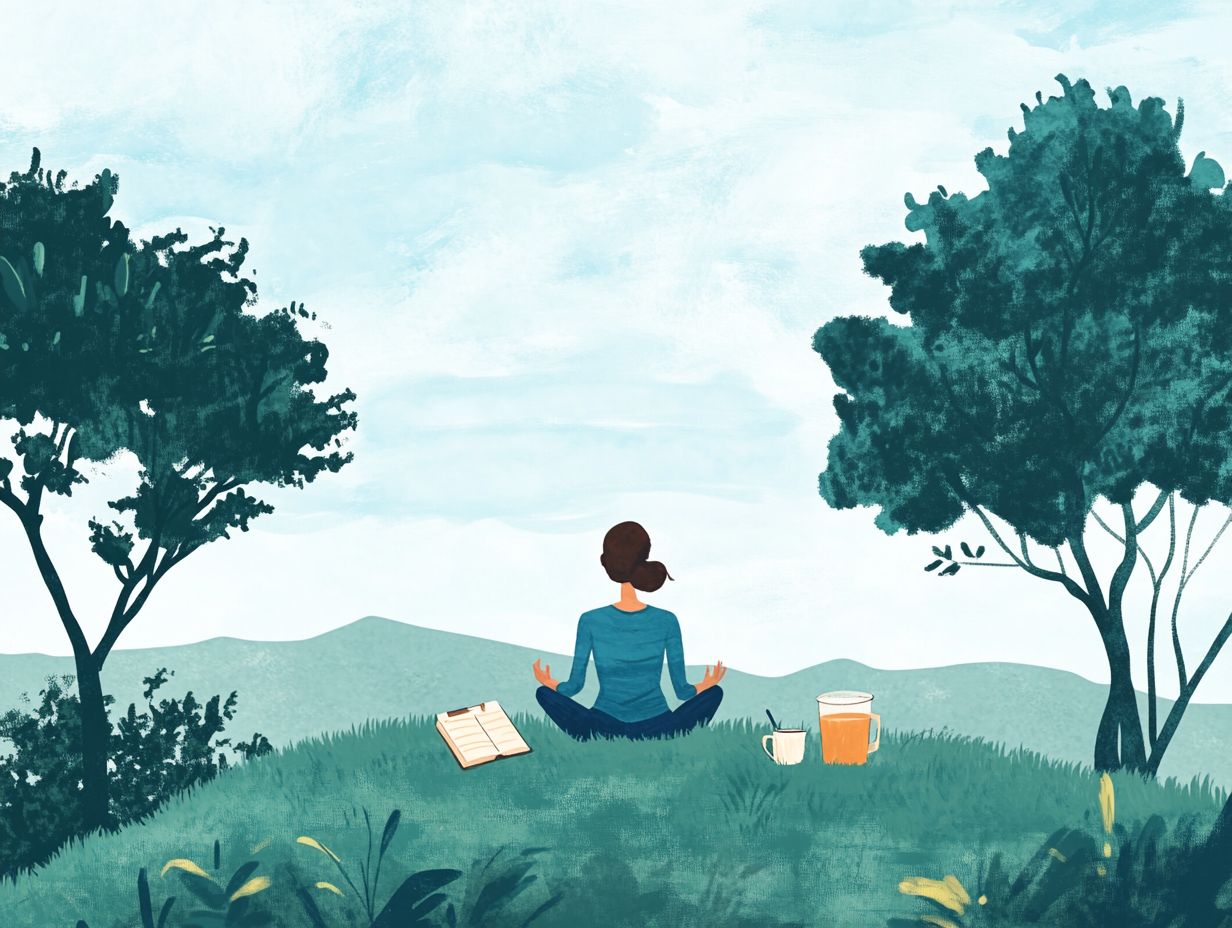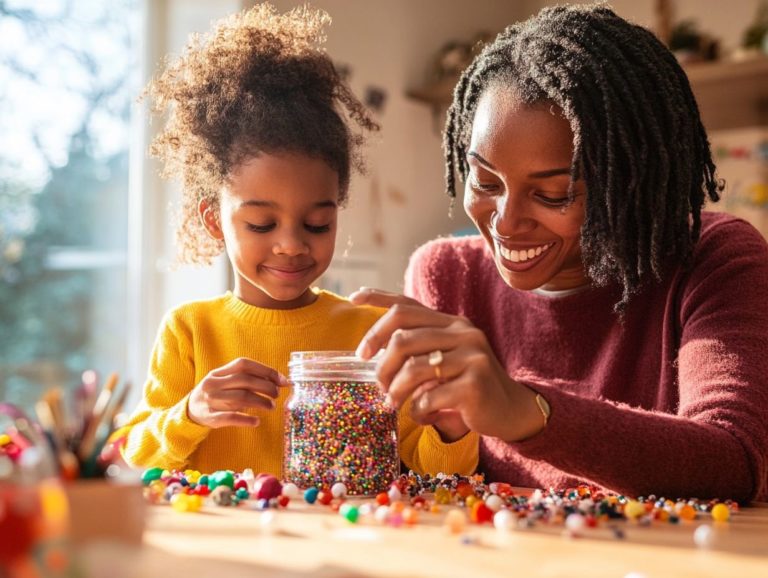Coping Strategies: Mindful Activities for Anxiety
Contents
- Understanding Anxiety and Coping Strategies
- Key Takeaways:
- What is Anxiety?
- What are Coping Strategies?
- How Can Mindful Activities Help with Anxiety?
- 1. Deep Breathing Exercises
- 2. Meditation
- Mindfulness Practices for Anxiety Management
- What are Other Coping Strategies for Anxiety Management?
- 1. Seeking Professional Help
- 2. Connecting with Supportive People
- 3. Practicing Self-Care
- 4. Setting Boundaries
- 5. Challenging Negative Thoughts
- Frequently Asked Questions
- What are some mindful activities I can do to cope with anxiety and promote inner peace?
- How does mindfulness meditation help with anxiety?
- Can journaling really help with anxiety?
- What are the benefits of practicing yoga for anxiety and physical health?
- How can coloring be a mindful activity for anxiety and anxiety relief?
- Can I combine multiple mindful activities to cope with anxiety and promote cognitive health?
Understanding Anxiety and Coping Strategies
Anxiety impacts millions, presenting itself as worry, tension, and a pervasive sense of unease. Grasping the essence of anxiety, including various anxiety disorders, and mastering effective anxiety management techniques is crucial for preserving your mental well-being.
This article delves into an array of coping strategies. You’ll discover practical techniques that promote tranquility and clarity, including deep breathing exercises, journaling, and enjoying nature.
Effective mindfulness techniques and resources, such as mindfulness workbooks and mindfulness apps, can help you manage symptoms.
Whether you are looking for personal relief or seeking to support someone else, these insights equip you with the tools to gracefully navigate anxious moments.
Key Takeaways:

- Mindful activities, such as deep breathing exercises and meditation, can help reduce symptoms of anxiety. Mindfulness meditation and other practices can provide significant anxiety relief.
- Mindful activities can be easily incorporated into daily routines. They do not require special equipment, making them accessible coping strategies for anxiety. Mindfulness resources ensure these practices fit seamlessly into your day.
- Along with mindful activities, seeking professional help and practicing self-care are important strategies for managing anxiety. Approaches like Acceptance and Commitment Therapy (ACT) and using self-acceptance worksheets can enhance your emotional regulation capabilities.
What is Anxiety?
Anxiety is a prevalent emotional response recognizable by feelings of tension and racing thoughts, as well as physical changes like elevated blood pressure. It can take various forms, including acute anxiety, generalized anxiety disorder (GAD), and panic attacks. Each can profoundly affect your psychological, cognitive, and physical health and overall quality of life.
The emotional discomfort that anxiety brings can significantly influence your behaviors and perceptions. To truly understand anxiety, it’s crucial to identify your underlying triggers and acknowledge its impact on daily life. Recognizing these effects and integrating mindful tools can be beneficial in this journey.
This recognition ultimately calls for effective management strategies and therapeutic interventions to regain control and enhance your well-being.
What are Coping Strategies?
Coping strategies encompass the techniques and methods you can use to manage stress, emotional pain, and anxiety effectively. These strategies promote emotional regulation and mental adaptability.
By utilizing these strategies, you can significantly enhance your ability to navigate anxiety triggers and emotional discomfort while building resilience. Resources such as mindfulness workbooks and mindfulness exercises can guide you through this process.
Effective coping strategies may include mindfulness practices, grounding exercises, and therapeutic techniques such as Acceptance and Commitment Therapy (ACT) that empower you to transform negative thought patterns into positive alternatives.
Understanding how to implement these strategies is vital for enhancing your mental health, achieving emotional clarity, and fostering your overall well-being. Mindfulness workbooks, like “The Mindfulness Workbook for Anxiety,” can be valuable resources in this endeavor.
What are Mindful Activities?
Mindful activities help you focus on the present moment. They improve emotional clarity and self-compassion. Rooted in mindfulness therapy and guided by experts such as Forsyth, Eifert, Khoury, Shapiro, and Twohig, these activities invite you to immerse yourself fully in the now. They skillfully minimize distractions from anxious thoughts.
You ll likely love trying common mindful exercises such as meditation, mindful breathing, and grounding techniques. These exercises help reduce emotional reactivity and pave the way for inner peace. By weaving these practices into your daily routine, you can significantly enhance your ability to manage anxiety and cultivate a positive mindset. Mindfulness apps like Headspace can support you in maintaining a consistent practice.
Dedicating just a few minutes each day to mindful practices allows you to observe your thoughts without judgment. This deepens your understanding of your emotional responses. Techniques like body scans which involve focusing attention on different parts of your body and nature walks help create a beautiful connection with the environment. They further anchor you in the present moment. Using mindfulness resources such as “Biofeedback and Mindfulness in Everyday Life” can provide structured guidance.
Engaging in these practices supports your psychological health by reducing the risk of anxiety-related symptoms. They also give you the power to tackle stress with greater resilience and clarity. This journey ultimately leads to improved overall well-being, enriching your life in profound ways.
How Can Mindful Activities Help with Anxiety?
Mindful activities are essential for managing anxiety. They foster present-moment awareness and help you reduce emotional reactivity. By engaging in mindfulness practices and using resources such as meditation scripts, you can experience significant improvements in your ability to alleviate anxiety.
You ll recognize and confront your anxiety triggers with greater clarity and composure. Techniques such as mindful breathing, grounding exercises, and meditation provide you with valuable tools to cope with the physical and emotional symptoms of anxiety. Mindfulness apps like Breathe2Relax can further enhance these practices.
These practices also enhance your resilience and promote psychological flexibility. Ultimately, they give you the skills necessary to navigate anxiety and cultivate a profound sense of inner peace.
What are Some Mindful Activities for Coping with Anxiety?
You can explore a variety of mindfulness activities that effectively help you cope with anxiety while enhancing your emotional clarity. They promote relaxation and overall well-being. Utilizing mindfulness workbooks, such as “The Mindfulness and Acceptance Workbook for Anxiety,” can provide structured guidance in these activities.
These activities can range from straightforward breathing techniques to more structured practices like meditation and yoga. All of these activities are designed to anchor you in the present moment and nurture a mindful mindset. Mindfulness therapy can also be integrated into these practices for deeper emotional work.
By incorporating these techniques into your daily routine, you can better manage your anxiety responses. You ll build resilience against triggers and foster a compassionate approach to self-acceptance regarding your emotional experiences. Self-acceptance worksheets can be beneficial tools in this journey.
Start your mindful journey today! Try these techniques now to see the benefits!
1. Deep Breathing Exercises
Deep breathing exercises serve as a cornerstone of mindfulness practice, designed to ease anxiety and foster relaxation through intentional breathing techniques. By directing your focus to your breath and engaging in slow, controlled inhalations and exhalations, you can significantly reduce emotional reactivity and stress levels. These mindfulness exercises facilitate greater emotional regulation and stress reduction.
This grounding technique not only helps center your mind and body but also helps you feel calm and clear-minded in the face of anxiety triggers. Regularly incorporating deep breathing exercises into your routine gives you the power to manage anxiety effectively, all while nurturing your emotional well-being.
To practice deep breathing, begin by finding a comfortable position whether seated or lying down and gently close your eyes to eliminate distractions.
- Inhale deeply through your nose, allowing your abdomen to expand fully.
- Hold your breath for a few moments before exhaling slowly through your mouth.
- Repeat this process for several minutes, cultivating a profound sense of calm and clarity.
The advantages of these techniques reach far beyond immediate relaxation; they enhance emotional regulation and encourage a healthier response to stress. This makes it easier for you to navigate life’s challenges with a centered and resilient mindset, promoting overall mental health.
2. Meditation

Mindfulness meditation is a potent technique for managing anxiety, inviting you to embrace present-moment awareness and fostering emotional clarity. By carving out time to turn your focus inward and observe your thoughts without judgment, you can cultivate a deeper understanding of your anxiety experiences and nurture psychological flexibility. Incorporating mindfulness workbooks offers valuable guidance and structure in your practice.
Engaging in regular meditation practice has been shown to diminish anxiety’s grip, enhance self-compassion, and foster a profound sense of inner peace. This practice becomes an essential tool in your anxiety management toolkit, giving you the power to develop a mindful mindset.
Incorporating a variety of techniques, such as breath awareness, body scanning, or loving-kindness meditation, allows you to tailor your practice to your unique needs and preferences, making mindfulness accessible to all. Each approach offers distinct benefits, from deepening relaxation to nurturing compassion towards yourself and others. Utilizing meditation scripts can help maintain a structured practice.
Mindfulness meditation is crucial for emotional health you’ll see amazing benefits as you learn to identify and address your anxiety triggers more effectively. Mindfulness apps and other mindfulness resources can support a consistent and effective practice.
By committing to a consistent practice, you can experience improved focus, greater emotional resilience, and an enhanced quality of life benefits that resonate far beyond the moments spent in meditation. Mindfulness apps can further support this journey, offering guided sessions and additional resources.
In conclusion, integrating deep breathing exercises and mindfulness meditation into your daily routine can lead to significant improvements in anxiety management and overall emotional well-being. Start practicing these techniques today for immediate relief!
3. Yoga
Yoga is an all-encompassing practice that weaves together physical postures, breathing techniques, and meditation, creating a powerful mindfulness tool for alleviating anxiety. As you engage in mindful movements and focused breathing, yoga invites you to regulate your emotions and find a sense of grounding, enabling a deeper connection with both your body and mind. Incorporating mindfulness exercises within your yoga practice can further enhance its effectiveness.
This holistic approach not only alleviates anxiety symptoms but also promotes relaxation and nurtures a mindful mindset. By seamlessly incorporating yoga into your routine, you can significantly boost your mental health and equip yourself with essential tools to manage anxiety. Resources like “The Mindfulness Workbook for Anxiety” can provide additional guidance on integrating mindfulness into your yoga practice.
Various styles of yoga, such as Hatha, Vinyasa, and Restorative, cater to different needs and offer unique benefits.
- Hatha yoga, with its slower pace and emphasis on alignment, serves as an ideal introduction to mindfulness for beginners.
- Vinyasa, on the other hand, synchronizes breath with movement through dynamic sequences, fostering a focused flow that helps you release stress and improve cognitive health.
- Meanwhile, Restorative yoga prioritizes relaxation through long-held postures, making it the perfect choice for those seeking to unwind and recharge. These mindfulness practices are integral for anxiety relief.
Ultimately, by embracing these mindfulness techniques, you can cultivate a heightened awareness of your emotional landscape and develop healthier coping mechanisms for everyday life, enhancing your psychological health.
4. Journaling and Mindful Exercises
Journaling is more than just putting words on a page; it s a mindful exercise that cultivates emotional clarity and self-reflection, making it an invaluable tool for navigating anxiety. By writing down your thoughts, feelings, and experiences, you can uncover insights into your anxiety triggers and understand your emotional reactivity patterns. This practice not only nurtures self-acceptance but also helps you process emotional discomfort, ultimately enhancing your mental health. Utilizing mindfulness workbooks like “The Mindfulness Workbook for Anxiety” by Forsyth and Eifert can provide structured guidance in this practice.
Incorporating journaling into your daily routine can significantly contribute to developing a mindful mindset and effective anxiety management strategies. Mindful tools such as meditation scripts and mindfulness apps like Headspace can complement your journaling practice.
The simple act of putting pen to paper invites you to slow down and engage with your emotions on a deeper level, often revealing connections you may not have noticed before. Techniques like gratitude journaling where you list three things you re thankful for each day can help shift your focus from anxiety to positivity, enhancing psychological flexibility.
Using prompts such as “What am I feeling right now?” or “What triggers my anxiety?” can spark self-exploration and facilitate clearer thinking. Reflective practices like free writing allow you to release pent-up thoughts, providing a sense of catharsis and building emotional resilience. You can also use mindfulness workbooks and self-acceptance worksheets to guide your journaling journey.
As you establish this routine, you may discover an increased ability to manage stress, manage anxiety, and maintain a balanced emotional state.
Mindfulness Practices for Anxiety Management
5. Coloring, Art Therapy, and Mindfulness Exercises
Coloring and art therapy are not just enjoyable activities; they are powerful, mindful practices that allow you to express your emotions creatively. This paves the way for anxiety relief and self-compassion. Through artistic expression, you can delve into and process emotional pain, creating an outlet for feelings that might be too complex to articulate with words.
These mindfulness activities can become an essential part of your anxiety toolkit. This mindful approach encourages relaxation and cultivates a deep connection with yourself, promoting present-moment awareness. By incorporating art therapy into your anxiety management plan, you significantly enhance your emotional well-being while equipping yourself with a valuable tool for navigating anxiety.
These activities are not just fun they’re exciting journeys toward self-discovery and emotional healing. As you immerse yourself in the vibrant world of colors and textures, you unlock a language of expression that resonates deeply within you.
Mindfulness activities like coloring engage your brain in a way that often leads to reduced stress levels. This enhances your self-compassion and fosters introspection.
Research has shown that participating in such creative practices can lower cortisol levels, proving that these activities are refreshing escapes and scientifically supported methods for alleviating anxiety symptoms and promoting emotional clarity.
6. Mindful Walking, Running, and Mindfulness Techniques
Mindful walking or running allows you to weave mindfulness into your physical activity. This creates a profound connection with both your body and the environment while promoting emotional clarity. As you focus on the sensations of your movement and your breath, you can refine your grounding techniques, which helps reduce anxiety and fosters a sense of tranquility.
Engaging in mindful walking or running also boosts your physical health and nurtures your mental well-being. This makes it a powerful strategy for managing anxiety. Mindfulness apps such as Breathe2Relax can enhance the experience by incorporating mindful breathing techniques.
These practices invite you to enhance your awareness of the world around you, allowing you to fully immerse yourself in the present moment. As you become attuned to the rhythm of your footsteps and the natural sounds surrounding you, you ll find it easier to release racing thoughts.
Integrating techniques such as deep breathing and visualization can amplify these benefits, reinforcing your emotional stability. This form of exercise cultivates a safe space for self-reflection, often leading to valuable insights that contribute to your personal growth.
Whether you find yourself navigating a bustling park or a serene trail, the journey of mindful movement transforms into a revitalizing experience that nurtures both your body and mind.
7. Listening to Music and Mindfulness Practices
Listening to music is a profound mindfulness activity that can elevate your emotional clarity and serve as a remarkable tool for managing anxiety. Music therapy has demonstrated its ability to alleviate emotional pain and lower anxiety levels by offering a comforting auditory experience that fosters relaxation. By thoughtfully selecting music that resonates with your emotional state, you can cultivate a sense of inner peace and actively engage with your feelings.
Start incorporating music into your daily mindfulness routine today for instant emotional relief! Whether it’s the gentle strumming of an acoustic guitar or the soothing sounds of nature-inspired melodies, the right music can help lower your heart rate and promote relaxation, enhancing your overall sense of well-being.
The rhythms and lyrics can serve as anchors, grounding you in the present moment and steering you away from anxious thoughts. By embracing this therapeutic approach, you can transform your mental landscape, welcoming the healing power of music as a true ally in your journey toward anxiety management.
8. Spending Time in Nature and Mindfulness Practices
Spending time in nature is not just a leisurely escape; it’s a life-changing mindfulness practice that enhances emotional well-being and serves as a natural remedy for anxiety relief. When you engage with the outdoors, you create a connection with your environment. This connection enables grounding exercises that deepen your present moment awareness and reduce emotional reactivity.
Utilizing mindfulness tools like meditation scripts can amplify the benefits of your time in nature. Nature therapy has been shown to alleviate feelings of anxiety, providing a calm setting for reflection and self-acceptance. By regularly immersing yourself in nature, you can significantly boost your mental health and overall well-being. Shapiro’s research on mindfulness meditation in nature highlights these effects.
Imagine taking a walk in a lush forest, sitting by a tranquil lake, or simply soaking in the sights and sounds of a vibrant park. In these moments, you tap into the calming effects of the natural world. This form of therapy encourages a refreshing shift in perspective, allowing you to step back from daily stressors and embrace mindfulness that clears the mind and soothes the spirit.
Research indicates that spending time in nature can lower cortisol, which is a stress hormone, while simultaneously lifting your mood. As you practice mindfulness outdoors, you not only enhance your emotional resilience but also cultivate a deeper appreciation for the beauty that surrounds you. In this way, nature therapy becomes a powerful ally in your journey of managing anxiety.
9. Practicing Gratitude and Mindful Attention

Practicing gratitude is a powerful mindfulness exercise that can lead to emotional clarity and cultivate a positive mindset. It serves as an effective strategy for managing anxiety. By consciously acknowledging the positive aspects of your life and expressing appreciation, you can shift your focus away from anxiety triggers and develop a more balanced perspective.
This simple practice enhances self-compassion and encourages mindful awareness of the present moment, contributing to your overall emotional well-being and resilience against anxiety. Mindfulness apps like Headspace and self-acceptance worksheets, which help you acknowledge and embrace your feelings, can provide additional support in practicing gratitude.
Many find that keeping a gratitude journal, where they regularly jot down moments of thankfulness, can truly boost their emotional regulation. This technique not only reinforces positive thoughts but also helps in recognizing patterns of negativity that often accompany anxious feelings.
Engaging in brief daily rituals, such as sharing three things you’re grateful for at the end of the day, can ground you in the present and provide a sense of connection. Research indicates that such practices can lower stress hormone levels and improve overall happiness, creating a psychological buffer against anxiety by fostering a deeper appreciation for life s simple pleasures.
10. Engaging in a Hobby and Mindfulness Practices
Engaging in hobbies offers you enjoyment and an effective means of weaving mindfulness into your daily routine. These activities promote emotional regulation and provide much-needed relief from anxiety. By pursuing your interests and passions, you can create a welcome distraction from anxiety triggers. This allows you to immerse yourself in positive experiences that nurture self-acceptance and emotional clarity.
Utilizing resources like “The Mindfulness and Acceptance Workbook for Anxiety” by Forsyth and Eifert can provide structured ways to incorporate hobbies into your anxiety management plan. When you dive into creative outlets like knitting or photography, you may discover a gentle reprieve from the chaos of everyday life.
These pursuits help cultivate a sense of presence and clear mental clutter. They serve not only as distractions but also as pathways to deeper self-discovery and relaxation. Dedicating time to explore your hobbies is a form of self-care that is essential for sustaining emotional wellness and managing anxiety.
Engaging in activities that promote flow a state where you lose track of time due to deep engagement enhances your feelings of fulfillment and peace. Ultimately, these pursuits act as a soothing balm against the strains of an anxious mind, contributing to comprehensive anxiety management.
Start practicing these techniques today to enhance your emotional well-being and manage anxiety effectively!
What are Other Coping Strategies for Anxiety Management?
Along with mindfulness practices, you have a wealth of coping strategies for effective anxiety management that can enhance your emotional regulation and overall well-being. Explore these strategies immediately to start managing your anxiety effectively!
These strategies encompass various techniques, such as:
- seeking professional help
- building connections with supportive individuals
- prioritizing self-care practices
- practicing mindful breathing
- using mindfulness techniques, like grounding exercises
By developing a personalized anxiety toolkit that incorporates these methods, you empower yourself to confront your anxiety triggers and navigate emotional discomfort with greater ease and resilience.
1. Seeking Professional Help
Professional help is crucial for managing anxiety disorders. It offers tailored therapeutic interventions and expert guidance. A range of treatment options is available, such as Acceptance and Commitment Therapy (ACT), cognitive behavioral therapy (CBT), and mindfulness therapy.
These therapies provide you with tools to challenge negative thought patterns. They also promote the ability to adapt your thoughts and feelings, leading to a significant reduction in anxiety symptoms.
Highly skilled therapists like Forsyth, Eifert, Khoury, Shapiro, and Twohig can offer personalized support that enhances your psychological health and emotional well-being.
ACT aims to help you accept your thoughts and feelings without judgment. On the other hand, CBT offers a structured framework to identify and modify unhelpful beliefs, guiding you toward a balanced perspective that supports better cognitive health.
Mindfulness therapy promotes awareness and self-reflection, encouraging you to observe your anxiety without becoming overwhelmed. Engaging in therapy creates a safe space for you to express yourself and fosters lasting skills that enhance your overall mental health.
2. Connecting with Supportive People
Building connections with supportive individuals can transform your anxiety management experience! These connections provide emotional support and foster a sense of belonging.
By developing relationships with friends, family, or support groups, you gain opportunities to share your anxiety experiences and develop positive coping mechanisms.
Such relationships form a network of understanding and encouragement. This network helps you build resilience against anxiety triggers and enhances your overall emotional health.
These connections validate your feelings and promote healthy discussions that lead to insights and alternative perspectives on your worries. Engaging in regular social activities, even simple conversations, can alleviate feelings of isolation that often accompany anxiety.
To cultivate these supportive ties, consider joining local or online groups that focus on shared interests or challenges, like anxiety relief or mindfulness activities.
Regularly reaching out to loved ones, whether through calls or meetups, nurtures a deeper sense of trust and compassion. Ultimately, it’s about creating an environment where open communication is encouraged, enabling you to share vulnerabilities and strategies that profoundly impact your anxiety management.
3. Practicing Self-Care
Practicing self-care is essential for maintaining your emotional well-being and effectively managing anxiety. By prioritizing self-care activities think exercise, proper nutrition, adequate sleep, and relaxation techniques you’ll build resilience that empowers you and eases the symptoms of anxiety.
Incorporating mindfulness resources and stress reduction techniques enhances the effectiveness of your self-care practices and contributes to your overall mental health. This equips you with valuable tools for navigating anxious moments.
The importance of these practices is clear: they create a balanced routine that nurtures both your mind and body. Simple steps, such as dedicating time to a favorite hobby or engaging in deep breathing exercises, can significantly impact your well-being.
By integrating mindfulness practices like meditation or yoga, you can ground yourself, reconnecting with the present moment and quieting overwhelming thoughts. Consistently embracing these self-care strategies not only alleviates the immediate effects of stress but also lays the groundwork for healthier coping mechanisms in the future.
4. Setting Boundaries
Setting boundaries is a crucial strategy for managing your emotions and coping with anxiety. By clearly defining your personal limits, you can create an environment that supports your mental health and fosters emotional clarity.
When you take the time to establish what is acceptable and what isn t, you empower yourself to prioritize your well-being and reduce anxiety triggers, enhancing your emotional health.
This process doesn t just alleviate feelings of overwhelm; it also reinforces your self-respect and personal values. Techniques like practicing assertive communication, using ‘I’ statements to articulate your needs, and recognizing your limits significantly boost your ability to set healthy boundaries.
With these tools at your disposal, you ll navigate challenging situations with greater confidence, ensuring you don’t overextend emotionally or mentally. Embracing the practice of setting boundaries paves the way for a more balanced life, where your emotional needs are acknowledged, leading to a deeper sense of peace, overall well-being, and self-compassion.
5. Challenging Negative Thoughts

Challenging negative thoughts is an empowering cognitive technique that significantly enhances your ability to manage anxiety and achieve emotional clarity. Through changing how you think, you can identify and reframe irrational beliefs and negative thought patterns that contribute to your anxiety and emotional discomfort.
Recognizing these harmful patterns helps you develop a deeper understanding of your emotions, building resilience in the face of stress. Techniques like journaling, mindfulness meditation, and thought-stopping provide you with the tools to interrupt negative spirals and replace them with more balanced, constructive thoughts, fostering emotional reactivity.
This transformation alleviates anxiety symptoms and empowers you to approach challenges with renewed confidence. With consistent practice, the process can lead to profound emotional clarity, enabling you to navigate life’s hurdles with a sense of control and optimism.
Frequently Asked Questions
What are some mindful activities I can do to cope with anxiety and promote inner peace?
Some mindful activities that can help you cope with anxiety include:
- Meditation
- Deep breathing
- Yoga
- Journaling
- Coloring
- Using mindfulness apps like Headspace or Breathe2Relax
How does mindfulness meditation help with anxiety?
Meditation helps with anxiety by allowing you to focus on the present moment and quiet your racing thoughts. It also makes you more aware of your thoughts and emotions, teaching you to observe them without judgment.
Can journaling really help with anxiety?
Yes, journaling can be a helpful coping strategy for anxiety. Writing down your thoughts and feelings can help you process them and gain perspective. It can also serve as a way to release pent-up emotions and reduce stress, contributing to better psychological health.
In conclusion, employing these strategies can significantly enhance your ability to manage anxiety and foster a sense of well-being.
What are the benefits of practicing yoga for anxiety and physical health?
Yoga offers numerous benefits for anxiety. It reduces physical tension and calms the mind, promoting relaxation.
It also increases self-awareness and improves overall physical health. Furthermore, yoga enhances emotional clarity.
How can coloring be a mindful activity for anxiety and anxiety relief?
Coloring serves as a mindful activity for anxiety. It helps you focus on the present moment while engaging in a calming and creative task.
This activity also reduces stress and promotes relaxation.
Can I combine multiple mindful activities to cope with anxiety and promote cognitive health?
Absolutely! You can mix various mindful activities to manage anxiety effectively.
For instance, start your day with meditation, journal in the afternoon, and finish with yoga before bed. Discover what works best for you and make it part of your daily routine, including activities from mindfulness workbooks!



